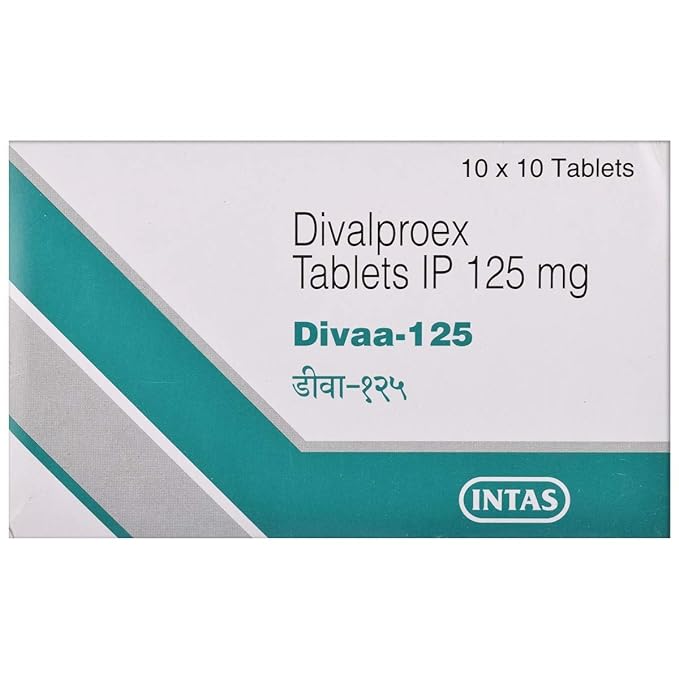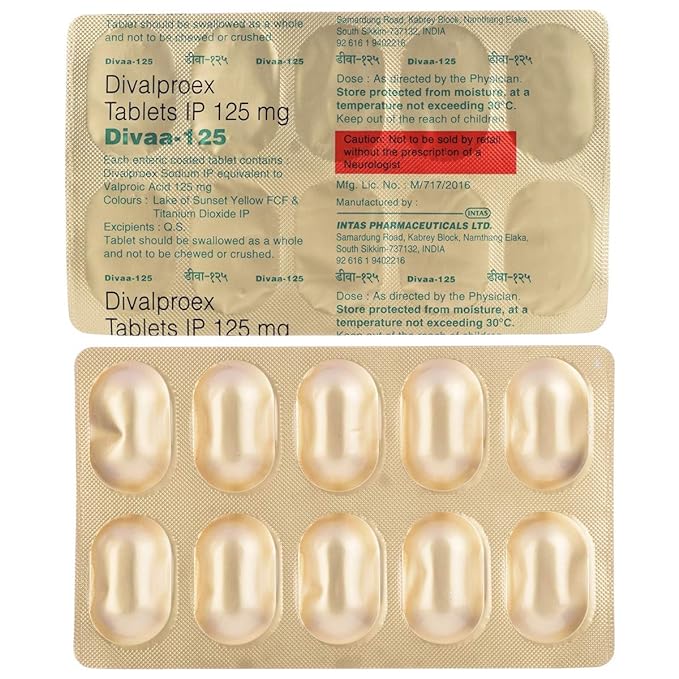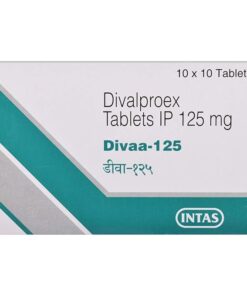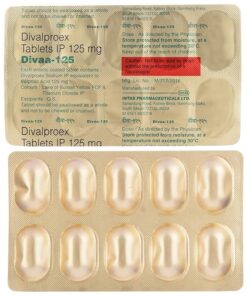Divaa 125 Mg
$26.00 – $44.00
Divaa 125 mg contains Divalproex Sodium, an antiepileptic medication used to treat seizures and bipolar disorder.
- Prevents seizures by stabilizing electrical activity in the brain.
- Manages mood swings associated with bipolar disorder.
- Can be used to treat migraine headaches by reducing frequency and severity.

NHS AFFILIATED DOCTORS

FDA APPROVED PHARMACY

AFFORDABLE PRICE GURANTEE

FAST & TRUSTED DELIVERY
Divaa 125 Mg is a medication containing Valproic Acid, which is primarily used to treat various types of seizure disorders and bipolar disorder. Valproic acid works by increasing the levels of a neurotransmitter called GABA (gamma-aminobutyric acid) in the brain, which helps to control seizures and stabilizes mood in patients with bipolar disorder.
Uses:
- Seizure Disorders: Divaa 125 mg is commonly prescribed for managing epilepsy, including partial seizures, generalized seizures, and other types of convulsions.
- Bipolar Disorder: It is used to treat bipolar disorder by controlling mood swings, particularly manic episodes.
- Migraine Prevention: Valproic acid may also be prescribed to prevent migraines.
Dosage & How to Take:
- Dosage: The starting dose for most adults with epilepsy or bipolar disorder is typically 125 mg once or twice a day, though the dose may vary depending on individual response and medical condition.
- Administration: Take Divaa 125 mg tablet with food to minimize gastrointestinal discomfort. Gulp down the tablet with a glass of water.
- Consistency: To achieve the best results, take Divaa at the same time each day as prescribed by your doctor. Try not to skip dosages or quit taking the medicine without speaking with your medical services supplier.
Precautions:
- Liver Disease: Divaa should be used with caution in patients with liver disease or liver problems as it can affect liver function. Ordinary liver capability tests are suggested during treatment.
- Pregnancy and Breastfeeding: Valproic acid can harm the fetus and should only be used during pregnancy if absolutely necessary and prescribed by a doctor. It is generally not recommended during breastfeeding.
- Blood Disorders: Inform your doctor if you have a history of blood disorders, as Valproic acid can affect blood clotting.
- Kidney Function: Use caution if you have kidney disease; your doctor may adjust the dosage or monitor your kidney function.
- Alcohol: Avoid alcohol while taking Divaa as it can increase the risk of side effects, especially affecting the central nervous system.
Side Effects:
- Common Side Effects: Nausea, vomiting, dizziness, drowsiness, tremors, and weight gain.
- Serious Side Effects: Liver problems, severe abdominal pain, dark urine, yellowing of the skin or eyes (jaundice), unusual bruising or bleeding, and changes in mood or behavior.
Frequently Asked Questions:
1. How does Divaa 125 mg work?
Divaa works by increasing the level of GABA in the brain, which helps calm the excessive electrical activity in the brain that causes seizures. It also stabilizes mood in patients with bipolar disorder.
2. Can I take Divaa with other medications?
Divaa can interact with other medications, including antidepressants, blood thinners, and other antiepileptic drugs. Illuminate your primary care physician pretty much all the meds you are right now requiring keeping away from expected collaborations.
3. How long does it take for Divaa to start working?
It may take several days or weeks to feel the full effects of Divaa, depending on the condition being treated. It’s important to take the medication regularly as prescribed for the best results.
4. Is Divaa safe for long-term use?
Divaa is generally safe for long-term use under the supervision of a healthcare provider, especially for controlling seizures and managing bipolar disorder. Regular follow-ups and blood tests are important to monitor for any potential side effects.
5. Can Divaa cause weight gain?
Yes, weight gain is a known side effect of Divaa. If you notice significant weight changes, it’s important to discuss this with your doctor, who may adjust your treatment plan accordingly.
| Pack Size | 100 Capsules, 150 Capsules, 200 Capsules |
|---|




















Shawn Warnke –
Divaa 125 Mg: the mood booster that’s turning my frowns upside down. Feeling like I’ve won the happiness jackpot!